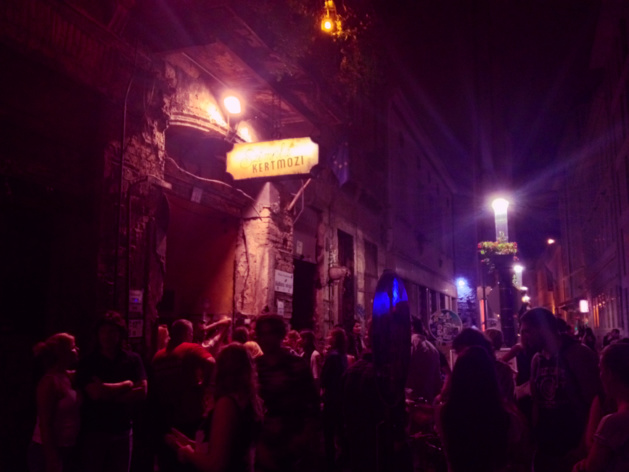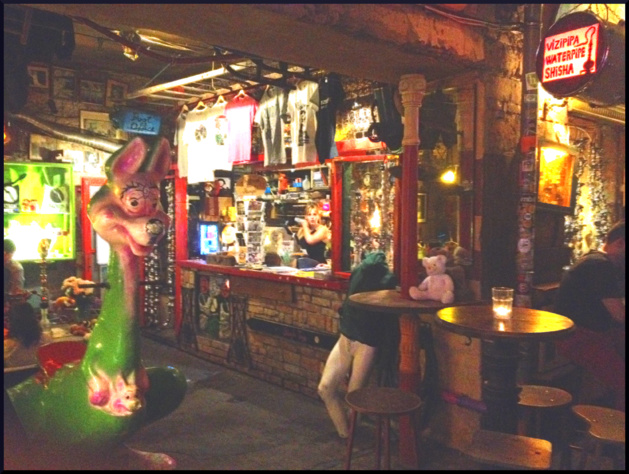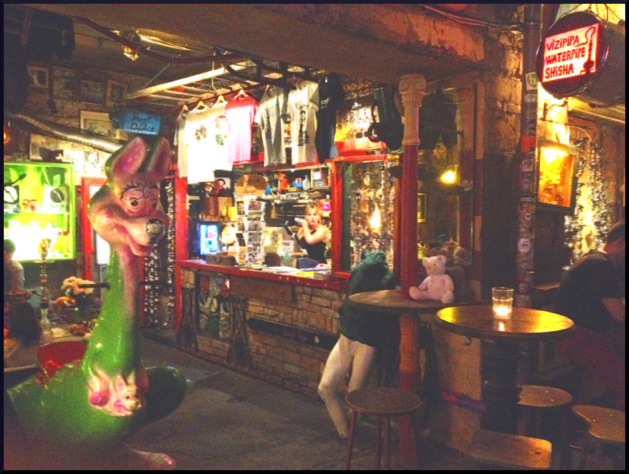
Credit DR
All around the world, the arrival of an Erasmus student is quite telling. The very first activity, even before registering for classes, is having a drink in one of the city’s trendy pubs . As for me, the city in question is called Budapest. Since I did not know about the local customs of the country regarding pubs, I did not expect to be asked to enter a “romkért”.
The “romkért” is the most popular kind of pub in Budapest. It translates literally as “garden of ruins”. Garden indeed, for each “romkért” includes an outdoor space, which is usually quite large. This space has no cover, or very little – just a few pieces of fabric. Since the vegetation is usually quite lush, it is easy to see that everything has been set up to turn the space into a garden. However, the “romkért” remains a pub. People mostly come to have a drink with their friends, like in every other pub. Hence the better known nickname: “ruin pub”.

The “ruin pub” has some distinctive features, such as its atmosphere, which cannot be found anywhere else and leaves no room for discomfort. It is not a ruined pub, but a pub made of ruins. The materials used, for the decoration as well as the structure itself, evoke an old abandoned building, which would never have been renovated by anybody. Whether this is an optical illusion or the place is genuinely disused, the old wooden scaffold or the stony, precarious vaults are there to give a true feeling of authenticity like nowhere else.
The true freshness of dilapidated materials
To enter a “ruin pub”, there is no use for a Windsor knotted tie or the latest smoking jacket. The main point is to be true to yourself and enjoy the mood. The disc jockey – not “DJ”, which would sound too contemporary – is also a part of the setting. The artist does not mix with a playlist straight from a Mac, but with a 45-rpm record player. The old legendary records are delicately chosen, to instil a peculiar mood, where modern jazz meets English pop.
This was the description of the typical Budapest “ruin pub”. The kind of place that makes you want to spend your nights being nostalgic but not melancholic, getting mesmerized by the music.

Maxim, a German Erasmus student, tells me that the “ruin pub” is often a mix between a trendy pub and a night club. It is a place where you can talk over drinks without shouting at the top of your voice to be heard, but also dance along to the rhythm of the music.
Szimpla Kert: the most renowned, the most visited, the most bizarre of the “ruin pubs”
Szimpla Kert is the epitome of Budapest’s “ruin pubs”. Created in 2001, it has no equal. Indeed, Szimpla Kert actually means “unique garden”. So unique that it has become the must-visit bar for anyone who wants to get to know the city.
There are some places everybody talks about, which intrigue you so much that you inevitably go and check them out. Excited by such high recommendations, you end up disappointed. Szimpla Kert does not belong to this category. You enter and then you leave without ever having seen everything. A shop at the entrance, a beer bar, a 70s car, a bike perched on the ceiling, overlooked by a Swiss cheese grater, burlap sacks as a roof, then an alcohol bar, a sweets bar upstairs, and a bass drum which announces the concert stage. This list only highlights the most obvious aspects of the setting. Thousands of small details make this place extremely charming. Not to mention the possibility of buying a carrot at the end of the night, to “honour the Hungarian tradition”.
Nevertheless, Szimpla Kert does not only offer the opportunity to spend a good night over a drink or a shisha pipe. This bizarre “romkért” also hosts the “Sunday farmer’s market”. Which means it is also possible to do some shopping there or have a brunch with your family on Sunday morning. The result is marvellous. The inside bars remain open, this time to provide freshly squeezed orange juice. The farmers who spread their stalls out are incredibly varied, while three young musicians contribute to the welcoming atmosphere. The success of this invention is clear to see: this “farmer’s market” never empties before it closes at 2pm.
Budapest has been able to get the best out of its old, deteriorating buildings, to attract young partygoers when night falls, but also all generations when the sun reappears. An inspiring example of restoration.






























